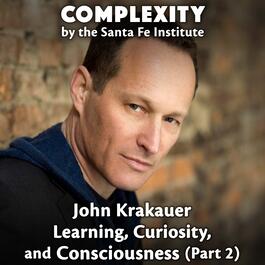
John Krakauer Part 2: Learning, Curiosity, and Consciousness
What makes us human? Over the last several decades, the once-vast island of human exceptionalism has lost significant ground to wave upon wave of research revealing cognition, emotion, problem-solving, and tool-use in other organisms. But there remains a clear sense that humans stand apart — evidenced by our unique capacity to overrun the planet and remake it in our image. What is unique about the human mind, and how might we engage this question rigorously through the lens of neuroscience? How are our gifts of simulation and imagination different from those of other animals? And what, if anything, can we know of the “curiosity” of even larger systems in which we’re embedded — the social superorganisms, ecosystems, technospheres within which we exist like neurons in the brain? Welcome to COMPLEXITY, the official podcast of the Santa Fe Institute. I’m your host, Michael Garfield, and every other week we’ll bring you with us for far-ranging conversations with our worldwide network of rigorous researchers developing new frameworks to explain the deepest mysteries of the universe. This week we conclude a two-part conversation with SFI External Professor John Krakauer, Professor of Neurology and Director of the Center for the Study of Motor Learning and Brain Repair at Johns Hopkins. In this episode, we talk about the nature of curiosity and learning, and whether the difference between the cognitive capacities and inner lifeworld of humans and other animals constitutes a matter of degree or one of kind… Be sure to check out our extensive show notes with links to all our references at complexity.simplecast.com . If you value our research and communication efforts, please subscribe, rate and review us at Apple Podcasts or Spotify, and consider making a donation — or finding other ways to engage with us — at santafe.edu/engage. Please also note that we are now accepting applications for an open postdoc fellowship, next summer’s undergraduate research program, and the next cohort of Complexity Explorer’s course in the digital humanities. We welcome your submissions! Lastly, for more from John Krakauer, check out our new six-minute time-lapse of notes from the 2022 InterPlanetary Festival panel discussions on intelligence and the limits to human performance in space… Thank you for listening! Join our Facebook discussion group to meet like minds and talk about each episode. Podcast theme music by Mitch Mignano. Follow us on social media: Twitter • YouTube • Facebook • Instagram • LinkedIn Referenced in this episode: Prospective Learning: Back to the Future by The Future Learning Collective (Joshua Vogelstein, et al.) The Learning Salon: Toward a new participatory science by Ida Momennejad, John Krakauer, Claire Sun, Eva Yezerets, Kanaka Rajan, Joshua Vogelstein, Brad Wyble Artificial Intelligence Hits the Barrier of Meaning by Melanie Mitchell at The New York Times Economic Possibilities for our Grandchildren by John Maynard Keynes The Intelligent Life of the City Raccoon by Jude Isabella at Nautilus Magazine The maintenance of vocal learning by gene-culture interaction: the cultural trap hypothesis by R. F. Lachlan and P. J. B. Slater Mindscape Podcast 87 - Karl Friston on Brains, Predictions, and Free Energy by Sean Carroll The Apportionment of Human Diversity by Richard Lewontin From Extraterrestrials to Animal Minds: Six Myths of Evolution by Simon Conway Morris I Am a Strange Loop by Douglas Hoftstadter Coarse-graining as a downward causation mechanism by Jessica Flack Daniel Dennett Susan Blackmore Related Episodes: Complexity 9 - Mirta Galesic on Social Learning & Decision-making Complexity 12 - Matthew Jackson on Social & Economic Networks Complexity 21 - Melanie Mitchell on Artificial Intelligence: What We Still Don't Know Complexity 31 - Embracing Complexity for Systemic Interventions with David Krakauer (Transmission Series Ep. 5) Complexity 52 - Mark Moffett on Canopy Biology & The Human Swarm Complexity 55 - James Evans on Social Computing and Diversity by Design Complexity 87 - Sara Walker on The Physics of Life and Planet-Scale Intelligence Complexity 90 - Caleb Scharf on The Ascent of Information: Life in The Human Dataome Complexity 95 - John Krakauer Part 1: Taking Multiple Perspectives on The Brain
From "COMPLEXITY"




Comments
Add comment Feedback